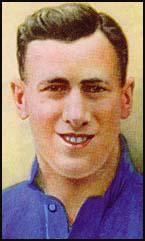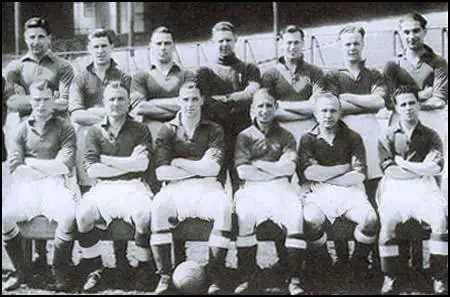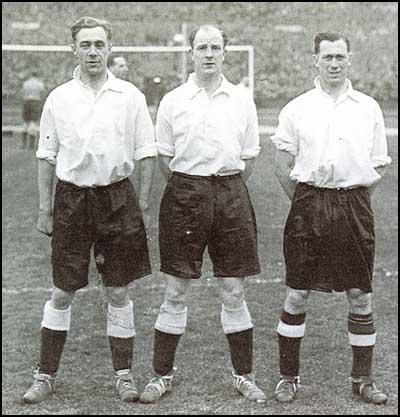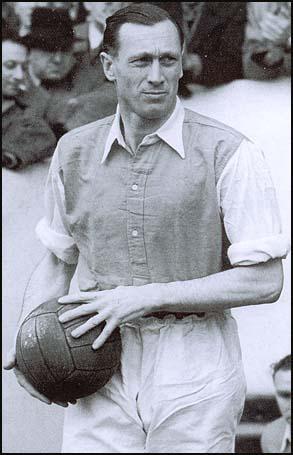Joe Mercer

Joseph (Joe) Mercer, the son of Joseph Powell Mercer, who played for Nottingham Forest and Tranmere Rovers, was born in Ellesmere Port on 9th August 1914.
Mercer played football in the streets of Ellesmere Port: "Back alley football is only a substitute for the real thing. We always have to right for bigger and better playing fields for children. But, all the same, the back alleys did hold some valuable lessons of their own. For instance, playing with a small ball. If you could control a small hall with certainty, you found later that bringing down a normal ball came more easily. It was wonderful training for the eye."
Mercer and his friend, Stan Cullis, both played football forCambridge Road School. Both showed outstanding ability and were selected to play for Ellesmore Port Boys against Chester Boys in January 1929. Two years later Mercer signed for Everton.
Joe Mercer made his debut at wing-half in April 1933. The team at that time included Dixie Dean, Cliff Britton, Ted Sager, Albert Geldard, and Jack Jones.
In December, 1936, Everton signed Tommy Lawton for a fee of £6,500. It was a record fee for a teenager. One of the attractions of the deal was that Lawton now had the opportunity to play with Dixie Dean. When they met for the first-time, Dean put his arm round Lawton and said: "I know you've come here to take my place. Anything I can do to help you I will. I promise, anything at all." Dean was thirty years old and after suffering several serious injuries, he knew that there was not much time left for him at the top. Dean kept his promise and spent a lot of time with Lawton on the training field.
Six weeks after joining the club, Tommy Lawton was brought into the first team for an away match against Wolverhampton Wanderers, as Dixie Dean was rested prior to a fifth round FA Cup tie with Tottenham Hotspur. Lawton found it difficult playing against the England centre-half, Stan Cullis, however, he did score a goal 15 minutes from the end.
Everton drew the FA Cup tie with Tottenham Hotspur 1-1 and it was decided to play Tommy Lawton alongside Dixie Dean in the replay. In the second minute Lawton scored with a tremendous shot from outside the penalty area. Dean turned to Mercer and said: "Well, that's it then. That's the swan song. That's the end of it." Dean realised that it would not be long before this talented player took his place in the side.
At the beginning of the 1937-38 season Tommy Lawton played at inside-right and Dixie Dean at centre-forward. The pairing did not work and Everton failed to win a game when they two men played together. On 8th September 1937, Dean was dropped and Lawton replaced him as centre-forward to play against Manchester City. Lawton scored in the 4-1 victory and Dean only played in two more games for Everton before leaving the club.
Everton finished in 14th place in the 1937-38 season with Tommy Lawton ending up as the club's top marksman with 28 goals in 39 league games. He was also the top scorer in the whole of the First Division. This was an amazing achievement for someone who was only 18 years old.
Mercer, who was only 24 years old, had developed into a great player for Everton. Tony Matthews in Who's Who of Everton points out that Mercer "was an outstanding wing-half with a biting tackle and a never-say-die attitude." Mercer won his first international cap for England against Northern Ireland on 16th November 1938. The England team that day also included Eddie Hapgood, Stan Cullis, Willie Hall, Tommy Lawton and Stanley Matthews. England won the game 7-0.
In the 1938-39 season Everton won the First Division league title, by beating Wolverhampton Wanderers by four points. Tommy Lawton was the club's top marksmen with 34 goals in 38 games.

Ted Sager, Joe Mercer, Norman Greenhalgh, John Jones. Front row: Torry Gillick,
Stan Bentham, Tommy Lawton, Alex Stevenson, Wally Boyes and Jimmy Caskie.
Joe Mercer won his fifth and last international cap for England against Romania on 16th November 1938. The England team that day also included Stan Cullis, Tommy Lawton, Frank Broome, Wilf Copping, Len Goulden and George Male. England won the game 2-0.
Tommy Lawton later commented: "Joe Mercer was a tremendous tackler, timing his interventions perfectly, and he loved nothing more than to bring the ball up and take part in an attack with his forwards. He had a deceptive speed, but then Joe was a deceptive player, probably due to those bandy legs of his."
The outbreak of the Second World War brought a halt to the Football League. The British Army invited some of the best footballers to became Physical Training instructors at Aldershot. This included Joe Mercer. Other top players at Aldershot included Wally Boyes, Cliff Britton, Matt Busby, Don Welsh, Billy Cook, Arthur Cunliffe, Archie Macaulay, Norman Corbett, Tommy Lawton, Bert Sproston and Eric Stephenson.

Joe Mercer played for Aldershot during the war.
Mercer returned to Everton after the war and stayed at the club until being transferred to Arsenal for a fee of £8,000 in November 1946. It was an excellent signing. According to Jeff Harris, the author of Arsenal Who's Who (1995): "Joe Mercer was one of the most influential players Arsenal have ever had." At the time the club was at the bottom of the First Division.
Mercer was appointed captain of the side and led Arsenal to the 1947-48 league championship and the 1950 FA Cup victory over Liverpool. That year he was voted by the Football Writers' Association (FWA) as their Footballer of the Year Award. Mercer won his third championship medal when Arsenal finished the 1952-53 season beating Preston North End on goal average.
Len Shackleton argued he was convinced that "Joe Mercer, as an Arsenal player between his thirtieth and fortieth birthdays, was a far better wing-half than in his younger days as an Everton and England player. When Joe Mercer discovered his legs would not allow him to run all over the field, when his physical condition hampered him, when he played almost entirely in his own half of the field, he was great. The service of wonderful passes that flowed from this spindly bow-legged genius was, I am certain, fifty per cent of the reason for Arsenal's post-war successes."

On 10th April 1954 Mercer played in a league game again Liverpool. Tommy Lawton, who had recently joined Arsenal, later described how he heard the "sickening crack" when Mercer collided with Joe Wade. His right-leg was fractured in two places and he was forced to retire from playing football.
Mercer ran a grocery shop in the Wirral before becoming manager of Sheffield United in August 1955. He moved to Aston Villa and in 1960 helped the club win the Second Division title. He resigned in July 1964 and the following year he joined Manchester City. He appointed Malcolm Allison as his assistant in 1966 and over the next few years he had great success winning the Second Division (1967), First Division (1968), the FA Cup (1969), League Cup (1970) and European Cup-Winners Cup (1971). In 1974 Mercer was the temporary manager of the England national side.
Joe Mercer died in Liverpool in August 1990.
Primary Sources
(1) Tommy Lawton, My Twenty Years of Soccer (1955)
Joe Mercer was a tremendous tackler, timing his interventions perfectly, and he loved nothing more than to bring the ball up and take part in an attack with his forwards. He had a deceptive speed, but then Joe was a deceptive player, probably due to those bandy legs of his.
This spindly-legged lad from Ellesmere Port is a football maniac. Even a bad break of his right leg failed to knock Joe out of the game. As soon as he could walk again - and it was a serious injury which kept him laid up for six months - Joe was out in track suit and training shoes. Yes, he wanted to get fit again so that he could take part in the odd game.
When you asked him whether he was finished with the game, Joe would tell you, "Not likely, but I suppose it has finished with me."
Joe has always been a great student of the game. He was even learning at the time he suffered the injury which necessitated his being carried from the Highbury ground on a stretcher, while the horrified spectators stood in silence.
He simply strode through a game. He had a thirst for the ball that could never be satisfied, and once he won possession - and they don't tackle any better than Joe Mercer - he would sweep forward and use the ball as it should be used. A short pass, a long pass, a high pass, a low pass. They all came the same to Joe Mercer, a great player, a great student of the game, and a great sportsman.
(2) Matt Busby, Soccer at the Top (1973)
Joe Mercer was an Everton player and I by now a Liverpool player. His name was Joe Mercer and he wasn't very happy. He was frustrated. He couldn't get into the first team. It was one of those spells all players suffer from sometime in their career, but it was unlike Joe Mercer to be miserable. Even by then I had found myself to be one of those people who apparently have a ready shoulder to cry on, although not many Everton players cry on the shoulders of Liverpool players. "I think I should be in the first team, Matt," he said. "I would like your advice." So I said: "The only thing to do is to force yourself into the first team. Get down to it, show them you have so much ability that they can't keep you out." He did, and he became an England wing-half.
I came across him later in the Army in Greece and Italy, where as "manager" of the Army team I put him in charge of rations, in which he was as good a provider of food as he was of telling passes. Next I met him when he was captain of England and I of Scotland, and there was never a craftier opponent. By the time he had moved from Everton to Arsenal I was manager of Manchester United. Only a broken leg ended his playing career at the venerable age of forty.
(3) Len Shackleton, Crown Prince of Soccer (1955)
I am convinced that Joe Mercer, as an Arsenal player between his thirtieth and fortieth birthdays, was a far better wing-half than in his younger days as an Everton and England player. When Joe Mercer discovered his legs would not allow him to run all over the field, when his physical condition hampered him, when he played almost entirely in his own half of the field, he was great. The service of wonderful passes that flowed from this spindly bow-legged genius was, I am certain, fifty per cent of the reason for Arsenal's post-war successes. How Joe was missed when a broken leg ended his long, illustrious career.
(4) Stan Mortensen, Football is My Game (1949)
Joe Mercer, of Everton and Arsenal. I think even above his half-back play I would place his captaincy-easily the best I have known. He has some trick of personality, perhaps connected with that broad grin of his, which made you pull out every little bit of effort that was packed within you. He has a level head, too. Sometimes I have seen a player shaping for a first-class row with a referee, but a couple of quiet words from Joe has soon put an end to that nonsense. He watches over his team-mates like a shepherd, always on hand. Those of us who played alongside him during and just after the war, learned a lot in the shape of on-the-field manners.
With his long, bow-shaped legs (we used to call him the Spiral Staircase), he seemed to be able to "steal an extra half-yard to reach a ball apparently well out of playing distance. Like Matt Busby, the present Manchester United manager, he never forgets a player. Once he has seen him, lie recalls his methods, his mannerisms, his likes and dislikes, and can therefore adopt strategy to meet any given set of opponents.
In 1947-8, Arsenal had a curiously mixed team. Some of the players were past their best, the forward line was never really settled - and yet they won the League championship with points to spare. I don't think they could have done it but for Joe.
